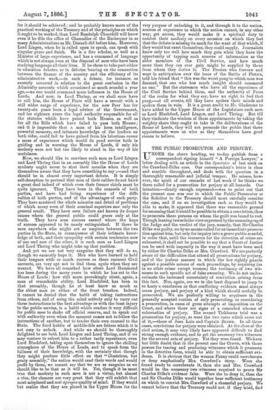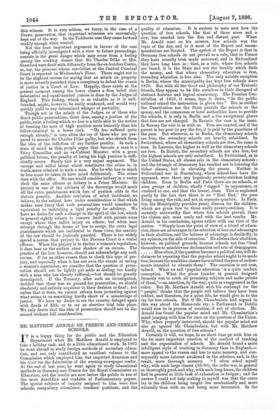THE PUBLIC PROSECUTOR AND PERJURY.
TINDER the above heading, we to-day publish from a correspondent signing himself "A Foreign Lawyer," a letter dealing with an article in the Spectator of last week on the Crawford-Mike case. Our correspondent's letter is clear and sensible throughout, and deals with the question in a thoroughly reasonable and judicial temper. He misses, how- ever, the spirit of our remarks of last week if he thinks we there called for a prosecution for perjury at all hazards. Our intention—clearly enough expressed—was to point out that the present case was one in which the Public Prosecutor or the Solicitor to the Treasury should most carefully consider the case, and if on an investigation such as they would be able to make, it appeared that there was reasonable ground for assuming that it would be possible to obtain a conviction, then to prosecute those persons on whom the guilt was found to rest. Though leaning towards the view expressed by the summing-up of the Judge and the verdict of the jury, namely, that Sir Charles Dilke was guilty, we by no means called for an immediate prosecu- tion against him, but only for inquiry into a grave public scandal, in order that, until the resources for the detection of crime are exhausted, it shall not be possible to say that a Court of Justice can be used with impunity in the way it must have been used by either Sir Charles Dilke or Mrs. Crawford. We are perfectly aware of the difficulties that attend all prosecutions for perjury, and of the jealous manner in which the law rightly guards against a possible misuse of such proceedings, by requiring (as in no other crime except treason) the testimony of two wit- nesses to each specific act of false swearing. We do not under- estimate the increased uncertainty of conviction arising from this fact. Nor, again, are we in the least disposed to jump to so hasty a conclusion as that conflicting evidence must always mean perjury, and perjury of a kind which should usefully be prosecuted. We are perfectly willing to acquiesce in the generally accepted custom of only prosecuting, or considering a prosecution, in cases of gross attempts at imposition on the Court, and where there are signs of a concerted scheme of subornation of perjury. The second Tichborne trial was a prosecution for perjury, as were the two cases which arose out of it,—those of Jean Lain and Captain Brown. In all three cases, convictions for perjury were obtained. At the close of the civil action, it may very likely have appeared difficult to find strong enough evidence, and to get the necessary two witnesses for the several acts of perjury. Yet they were found. We have but little doubt that in the present case the Crown, with those powers for tracing and producing witnesses which it possesses in the detective force, would be able to obtain sufficient evi- dence. It is obvious that the woman Fanny could corroborate or deny emphatically Mrs. Crawford's story. Were she found ready to corroborate it, then she and Mrs. Crawford would be the necessary two witnesses required to prove Sir Charles Dilke's evidence false. Were she to deny it, then she and Sir Charles Dilke would together bear sufficient testimony on which to convict Mrs. Crawford of a shameful perjury. We cannot believe that the Treasury could not, if they tried, find
this witness. It is very seldom, we fancy, in the case of a Crown prosecution, that important witnesses are successfully kept out of the way. In the Tichborne case they came forward readily enough when wanted.
Not the least important argument in favour of the case being officially investigated with a view to future proceedings, consists in the great danger which may occur from a feeling among the working classes that Sir Charles Dilke or Mrs. Crawford were dealt with differently from the ex-butcher Castro, .or, say, the prisoner whose conviction at the Central Criminal Court is reported in Wednesday's Times. There ought not to he the slightest excuse for saying that an attack on property is more severely punished than a conspiracy to defeat the course of justice in a Court of Law. Happily, there exists at the present moment among the lower classes a firm belief that substantial and equal-handed justice is done by the Judges of England. This feeling, which is as valuable as it is well- founded., might, however, be easily weakened, and would very quickly yield to any determined whisper of partiality.
Though not in the minds of the Judges, or of those who direct public prosecutions, there does, among a portion of the public, exist a feeling which we fear is a little akin to the notion of treating the man of high position more leniently than his fellow-criminal in a lower rank. "He has suffered quite enough already," is very often the cry of those who are pre- pared to assume Sir Charles Dilke guilty, but who shrink from the idea of the infliction of any further penalty. In such a state of mind as this, people argue that because a man is a Privy Councillor and an ex-Cabinet Minister, with a great political future, the penalty of losing his high position is suffi- ciently severe. Surely this is a very unjust argument. The corrupt and wilful intent which constitutes the crime is, in truth, more criminal in such a man. For he who has so much to lose must be taken to have acted deliberately. The crime 'rises with the office. No one would consider bribery in a vestry clerk the same offence as bribery in a Prime Minister. So perjury in one of the advisers of the Sovereign would merit all the extra punishment which loss of position adds to the statute penalty. Another confusion of mind incidental, we believe, to the subject here under consideration is that which makes men fancy that such prosecutions would somehow be equivalent to instituting a legal penalty for adultery. We have no desire for such a change in the spirit of the law, which in general rightly refuses to concern itself with private vices except where they inflict injury on others ; but when men attempt through the forms of law to escape the extra legal punishments which are incidental to those vices, the sanctity of the law should be jealously guarded. There is too widely spread a notion that perjury in the Divorce Court is a venial offence. When the perjury is to shelter a woman's reputation, it does bear on the surface some shadow of an excuse. The practice of the law, however, should not acknowledge any such excuse. If for no other reason than to check this type of per- jury, and especially when it has not even the excuse of saving a woman's reputation, we consider that the question of prose- cution should not be lightly put aside as dealing too hardly with a man who has already suffered,—but should be gravely investigated. If the Treasury, after such an investigation, decided that there was no ground for prosecution, we should absolutely and entirely acquiesce in their decision as final ; but unless that is done, we cannot refrain from protesting against what seems to us something hardly short of a miscarriage of justice. We have no desire to see the country deluged again with floods of filth, or to see an abortive trial take place. We only desire that the idea of prosecution should not be dis- missed without full consideration.



































 Previous page
Previous page